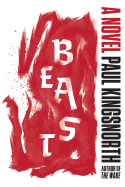
Beast is the second in Paul Kingsnorth's planned trilogy. The first, The Wake, was post-apocalyptic fiction set a thousand years ago and written in an invented language. Beast shares its main character, but feels more like McCarthy's The Road, its language spare and intense. In these novels, Kingsnorth searches beyond current civilization to ask how we might live instead. He doesn't have answers, and his anguish is haunting.
Beast follows Edward Buckmaster, a man compelled to escape the literal and spiritual noise of the city. He's left his family to live on the vast English moor, "far from the estates and the ring roads and the car parks and the black fields of beet and the screen-dumb people pacing out the slow suicide of the West."
Buckmaster finds a derelict barn; he fixes it up. He suffers an injury; he heals. He visits an empty church. He wanders in the heather. He senses some undefined beast tracking him and begins to hunt it instead. In his isolation and increasing obsession, Buckmaster's mental state deteriorates. He becomes more animal.
Fair warning: Beast is challenging, as many books about hermits can be. Little happens, the structure is bare and there's minimal punctuation to buttress reading. It reckons with God and humanity, and is designed to be read millennia from now. That might be arrogant if the author presumed to offer answers, but the novel is written primarily in a questioning register. Beast may very well succeed at surviving. --Zak Nelson, writer and bookseller

